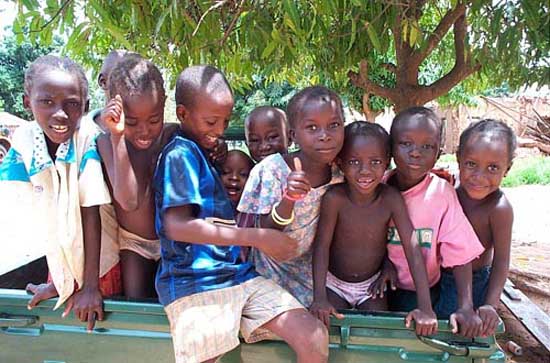
Phil Lilienthal said he has wanted to take his passion for children's camps to Africa ever since he and his wife volunteered with the Peace Corps in Ethiopia during the 1960s
Camp caters to children of HIV-infected parents
By DANIELLE GAMIZ
Staff Writer
Copyright © 2004 Blethen Maine Newspapers Inc.
FAYETTE -- The children who visit Camp Winnebago in Fayette and those who attend Camp Sizanani in South Africa have starkly different home lives.
The boys at Camp Winnebago are mostly white and come from affluent families whose parents pay to give them a camp experience each summer.
Sizanani campers, on the other hand, are black South African children who come from low-income homes and, sometimes, abusive families. They also have at least one parent who is infected with HIV.
Despite the vast social differences, the campers all fall in love with the same rigorous schedule of sports and activities offered in these once-in-a-lifetime settings.
"I think there are many more similarities than differences," said Phil Lilienthal, who has served as director of both camps.
Lilienthal's family has operated Camp Winnebago on Echo Lake since 1942. The Virginia lawyer's father led the camp before he took it over in 1974.
In the past decade, Lilienthal passed the camp's administrative duties on to his son, Andy, to make time for starting a new camp for South African children whose families are affected by HIV.
HIV is the virus that causes AIDS -- an affliction in which a virus has weakened the body's immune system to the point where serious infections, and death, occur.
Lilienthal said he has wanted to take his passion for children's camps to Africa ever since he and his wife volunteered with the Peace Corps in Ethiopia during the 1960s. Ethiopia had allowed for children's camps to be offered during school holidays at that time, but they eventually were discontinued by subsequent governments.
"It was just something I wanted to do in the future. But I wanted to come back and get involved in Camp Winnebago," Lilienthal said.
Last year, Lilienthal saw his chance to head back to Africa and start up another camp. This time, he wanted to tie HIV/AIDS education into the schedule.
About 38 million people are living with HIV, according to a report released in June by the Joint United Nations Program on HIV/AIDS. An estimated 25 million of those people live in sub-Saharan Africa and 5 million of them live in South Africa, where Lilienthal runs Camp Sizanani (Zulu for "helping each other").
In May 2003, Lilienthal scouted some possible sites for the camp. He eventually picked a site in Johannesburg, South Africa, where he teamed up with an HIV clinic that treats 12,000 infected adults each year.
The camp hosted its first campers in January with support from private donations, mostly from families and foundations in the United States. The organization -- called WorldCamps -- has offered four camps so far for boys and girls ages nine to 15.
Lilienthal and other camp staff members patterned the activities after Camp Winnebago's schedule with one difference: The children play sports, swim and make crafts, but they also attend a daily life-skills course in which they learn about HIV prevention and talk about dating, sex, disease, physical and emotional abuse, nutrition and self-esteem.
The education comes at a critical time in these youngsters' lives, Lilienthal said, because they are approaching or going through puberty.
"We just want to get them pre-sexually active," he said.
And the kids seem to listen.
"These are lovely, pleasant kids and they're so resilient. You'd never know there was a problem until something comes up and a child says 'I only ate (one meal) all day'," Lilienthal said.
After camp is over, children are encouraged to return every two weeks for games and follow-up talks with councilors about coping with life skills during their everyday lives.
The camp hopes to see some gains from their HIV-education efforts in the next five to 10 years. Success will be measured by how healthful the children become as adults. Lilienthal hopes to see a decline in the number of children who test positive for HIV later in life.
South African children are not tested for the virus when they are young because of the social stigma it carries, but Lilienthal said about 5 percent of each group of campers takes some sort of HIV-related medication.
"We know (HIV infection is) much higher than that," Lilienthal said.
It takes roughly $65,000 to run each two-week camp. They organization hopes to qualify for some federal HIV/AIDS grants and soon will start soliciting for donations in South Africa.
WorldCamps hopes to serve 900 boys and girls each year and eventually wants to expand the program to other South African provinces and neighboring countries.
In addition to bringing happiness to the children who visit Camp Sizanani, staff members also are changed by the experience, said Dylan Ris, a former Camp Winnebago counselor who also worked at the camp in South Africa.
Ris, who lives in New York City, said many of Sizanani's campers have very little interaction with white adults and also are curious about Americans. The camp offers a wonderful cultural exchange opportunity for the children and counselors, he said.
"I would love to go back."
Danielle Gamiz--623-3811, Ext. 431
dgamiz@centralmaine.com
